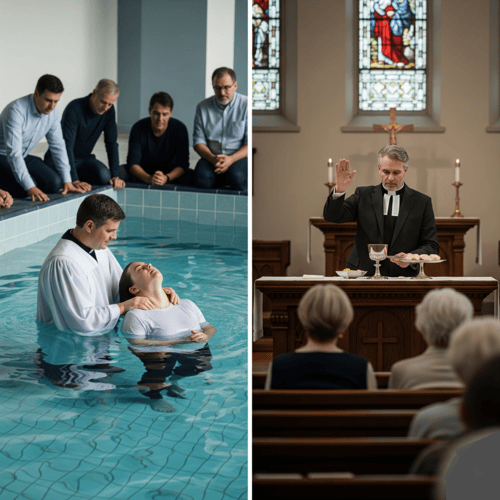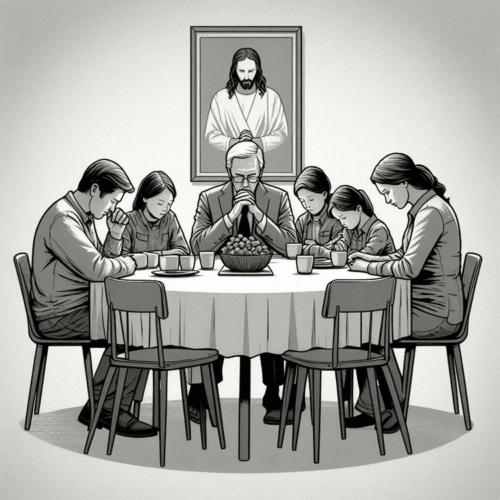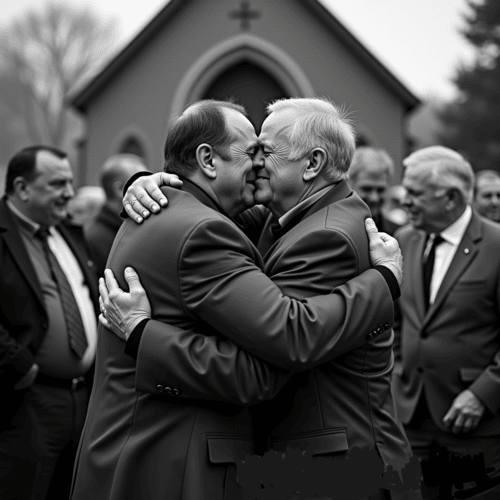Baptism and the Lord’s Supper: Why the Sacraments Truly Matter
In a world where faith often falters under the weight of doubt and distraction, God has graciously provided the sacraments—Baptism and the Lord’s Supper. They’re tangible lifelines to strengthen and sustain His people. Yet, many Christians wonder: do the sacraments really matter? Are baptism and communion merely outdated ceremonies, or do they serve a vital purpose in the life of faith? The Reformed tradition offers a compelling, Scripture-backed answer that reveals these sacred acts as far more than symbolic gestures—they’re powerful means by which God strengthens and nourishes His people.
WHAT ARE THE SACRAMENTS?
The word “sacrament” comes from the Latin sacramentum, originally meaning a soldier’s oath of allegiance—a sacred, binding pledge. When early Christians adopted this term, they captured something profound: the sacraments are God’s sacred pledges to us, visible confirmations of His invisible grace.
John Calvin defined sacraments as “external signs by which the Lord seals on our consciences the promises of his good will toward us.” They are not sources of grace but means of grace—channels through which God confirms and strengthens the faith He has already given us.
Reformed theology recognises only two sacraments: baptism and the Lord’s Supper. Why only two? Because only these were directly instituted by Christ himself. Jesus commanded baptism in the Great Commission (Matthew 28:19) and established communion on the night before His crucifixion (1 Corinthians 11:23-26). While other traditions recognise additional sacraments, the Reformed position holds only these two as bearing Christ’s explicit command and promise.
The sacraments function as both signs and seals. As signs, they point us to spiritual realities we cannot see. As seals, they confirm God’s covenant promises in our hearts. Paul illustrates this beautifully when he calls circumcision “a seal of the righteousness that [Abraham] had by faith” (Romans 4:11). Just as circumcision sealed God’s covenant with Abraham, our sacraments seal God’s covenant with us in Christ.
THE VITAL ROLE OF SACRAMENTS IN FAITH
God knows our weakness. We’re embodied creatures who learn through our senses, and our faith—though it comes by hearing (Romans 10:17)—is strengthened by seeing. This is not a failure of faith but a gracious accommodation by God to our human nature.
When the prophet Isaiah offered King Ahaz any sign to confirm God’s promise, he wasn’t encouraging doubt but providing assurance (Isaiah 7:11). Similarly, Jesus didn’t rebuke Thomas for wanting to see His wounds but graciously provided the evidence he needed (John 20:27-29). The sacraments serve this same purpose—they’re God’s gracious provision for our need to see and touch the realities of faith.
Baptism marks our entry into the covenant community. When the Ethiopian eunuch asked, “What prevents me from being baptised?” (Acts 8:36), he understood baptism was the visible doorway into the family of God. It represents our union with Christ in His death and resurrection (Romans 6:3-4), washing away not our sins themselves but testifying to the cleansing we have already received through faith.
The Lord’s Supper provides ongoing nourishment for faith. Jesus called himself “the bread of life” and declared, “Whoever feeds on my flesh and drinks my blood has eternal life” (John 6:35, 54). The communion table makes these spiritual realities tangible, feeding our souls with Christ himself through the elements of bread and wine.
Both sacraments point to justification by faith alone, not by works. They do not earn God’s favour but confirm the favour He has already shown us in Christ. As the Westminster Confession states, they “confirm our interest in Christ” without adding anything to His finished work.
WHO MAY PARTAKE AND WHO SHOULD ABSTAIN
The sacraments aren’t for everyone at every time. Scripture provides clear guidance about proper participation.
Baptism belongs to believers and their children. The New Testament records entire households being baptised (Acts 16:15, 33), and Paul connects Christian baptism to Old Testament circumcision, which included infants (Colossians 2:11-12). When Peter proclaimed the gospel at Pentecost, he declared the promise was “for you and for your children” (Acts 2:39). Reformed churches practice infant baptism because we believe God’s covenant includes the children of believers, just as it did in the Old Testament.
Baptism is a once-for-all ordinance. Paul speaks of “one baptism” (Ephesians 4:5) because it represents our definitive entrance into God’s family. Like physical birth, it cannot and need not be repeated.
The Lord’s Supper requires more careful preparation. Paul warns participants must “examine themselves” before eating and drinking (1 Corinthians 11:28). This examination isn’t about perfection but about understanding what the supper represents and approaching it with faith and repentance. Those who take communion must be able to “discern the Lord’s body” (1 Corinthians 11:29)—recognising both Christ’s sacrifice and the unity of His church.
Children of believers may participate once they reach an age where they can meaningfully examine themselves and understand the significance of their actions. Different Reformed congregations apply this principle with varying specificity, but the principle remains consistent.
Some should abstain from the Lord’s Table. Paul explicitly excludes those living in unrepentant sin and under church discipline (1 Corinthians 5:11-13). Visitors who’re not in good standing with a Bible-believing church should also refrain until they can demonstrate their faith and repentance to the local church leadership.
The consequences of injudicious participation are serious. Paul warns that those who eat and drink “without discerning the body” bring judgement upon themselves, resulting in weakness, illness, even death (1 Corinthians 11:27-32). This isn’t because the elements themselves are magical, but because treating sacred things carelessly demonstrates a heart that doesn’t properly value what Christ has done.
HOW SACRAMENTS ARE VITAL TO CHRISTIAN LIFE
The sacraments shape Christian life in multiple vital ways.
They create and demonstrate corporate unity. Paul declares that “in one Spirit we were all baptised into one body” (1 Corinthians 12:13). When we share the communion table, we show that “we who are many are one body, for we all partake of the one bread” (1 Corinthians 10:17). In our individualistic age, the sacraments remind us that Christianity is fundamentally communal.
They promote ongoing sanctification. Our baptism reminds us daily that we have “died to sin” and should “walk in newness of life” (Romans 6:6-7). The Lord’s Supper provides spiritual nourishment for continued growth in grace. Regular participation cultivates both gratitude for God’s mercy and sorrow for our continued need of it.
They serve as evangelistic witnesses. Every baptism publicly testifies to the transforming power of the gospel. Every celebration of communion proclaims “the Lord’s death until he comes” (1 Corinthians 11:26). Both sacraments challenge watching unbelievers with the reality of Christ’s claims.
They nurture eschatological hope. Baptism points forward to our final resurrection when we will be “united with [Christ] in a resurrection like his” (Romans 6:5). The Lord’s Supper anticipates the great wedding feast of the Lamb when Christ returns (Revelation 19:9). We taste now what we will feast upon forever.
Finally, proper sacramental theology protects against dangerous errors. It guards against sacramentalism—the false belief that sacraments automatically convey grace regardless of faith. It prevents rationalism—reducing sacraments to mere symbols with no spiritual significance. And it counters individualism—the notion that we can have a “personal relationship with Jesus” without commitment to His body, the church.
CONCLUSION: WHY THE SACRAMENTS TRULY MATTER
The sacraments aren’t optional accessories to faith but Christ-ordained means by which God strengthens, confirms, and nourishes His people. They bind us to Christ, to His promises, and to His body the church. Wey rightly treasure them as vital expressions of covenant grace—neither magical rituals nor empty symbols, but powerful instruments of spiritual growth in the hands of our sovereign God.
In baptism, we see our death and resurrection with Christ. In communion, we taste His ongoing provision for our souls. Both remind us our faith rests not on our own strength but on the finished work of Jesus Christ. For this reason, the sacraments truly matter—not because they save us, but because they beautifully display and powerfully confirm the salvation that is already ours through faith alone in Christ alone.
When we approach the baptismal font or the communion table with proper understanding and genuine faith, we encounter not mere water, bread, and wine, but the living Christ himself, graciously condescending to meet us in our weakness and strengthen us for the journey ahead. This is why Reformed Christians have always held the sacraments in such high regard—they’re Christ’s gifts to His church, precious means of grace that will nourish our souls until we see Him face to face.
WHY THE SACRAMENTS TRULY MATTER: RELATED FAQs
Do Reformed churches practice open or closed communion? Most Reformed churches practice “close communion,” restricting participation to baptised believers in good standing with orthodox churches. Modern Reformed scholar Michael Horton argues for openness to all credible professors of faith, while RC Sproul advocated stricter oversight requiring membership examination. The principle behind close communion is protection—both of the participant (1 Corinthians 11:29) and the sacrament’s integrity.
- Why don’t Reformed churches recognise confirmation, marriage, ordination, penance, and extreme unction as sacraments? Reformed theology limits sacraments to those explicitly instituted by Christ with visible signs and divine promises. Contemporary theologian Kevin Vanhoozer explains true sacraments require three elements: Christ’s institution, visible signs, and gospel promises. Marriage predates Christianity, ordination recognises rather than conveys grace, penance contradicts justification by faith alone, and extreme unction lacks clear New Testament warrant as a distinct sacrament.
- What’s the Reformed view on rebaptism for adult converts who were baptised as infants? Reformed theology strongly opposes rebaptism because baptism represents God’s unchangeable covenant promise, not our subjective experience. Modern scholar Sinclair Ferguson argues demanding rebaptism undermines the gospel by making baptism dependent on our response rather than God’s grace. When adults come to faith after infant baptism, Reformed churches encourage them to “claim their baptism” through public profession rather than repeat the sacrament. The Westminster Confession states baptism is “not to be administered again to any person.”
How do Reformed churches handle communion elements? Must they be wine and unleavened bread? Reformed churches show flexibility on elements while maintaining theological principles, with most using wine (or grape juice) and bread without dogmatic requirements for specific types. Contemporary theologian Cornelis Venema notes Scripture doesn’t specify unleavened bread for communion, and many churches offer grape juice for those with alcohol concerns. The key principle is that elements should clearly represent what Christ intended while showing pastoral sensitivity to legitimate needs.
- What do theologians say about the frequency of communion? There’s growing movement toward more frequent communion, with scholars like Tim Keller and Ligon Duncan advocating weekly celebration rather than monthly observance. Calvin himself preferred weekly communion, and Reformed theologian Keith Mathison argues this better fulfils Paul’s instruction to proclaim the Lord’s death “whenever” we participate. However, other Reformed leaders caution against treating frequency as doctrine rather than wisdom.
- How do churches approach communion for children with developmental disabilities? Modern Reformed churches increasingly apply “self-examination” standards with wisdom and compassion, recognising that cognitive capacity shouldn’t be measured by typical standards. Reformed ethicist Gilbert Meilaender argues the focus should be on understanding love, belonging, and basic spiritual realities rather than complex theology. The key principle is discerning whether the person can meaningfully participate in the faith community and show evidence of loving Christ. Many churches now provide special pastoral guidance for families, emphasising grace over rigid requirements.
Do churches practice foot washing as a sacrament, and what about other biblical practices like anointing with oil? Reformed churches don’t practice foot washing as a sacrament because it lacks the ongoing institutional character of baptism and communion, though some observe it ceremonially during Holy Week. Reformed scholar DA Carson distinguishes between Jesus’ symbolic teaching action and sacramental institution—He didn’t establish foot washing as a perpetual ordinance like communion. Regarding anointing with oil, most Reformed churches practice this as pastoral care rather than sacrament, with the focus on prayer and congregational support rather than the oil conveying grace.
WHY THE SACRAMENTS TRULY MATTER: OUR RELATED POSTS
Editor's Pick

From Empty to Overflow: The Abundant Life Jesus Promised
(AND WHY YOU SHOULDN’T SETTLE FOR LESS) We're surviving, but are we thriving? If we're honest, there's a gap between [...]

What Does Jesus Save Us From?
THREE BIBLE TRUTHS ABOUT SALVATION "Jesus saves." We’ve seen it on bumper stickers, heard it shouted at sporting events, maybe [...]

If God Wants Everyone Saved, Why Aren’t They?
THE REFORMED VIEW ON GOD’S DESIRE VS HIS DECREE The question haunts every believer who has lost an unbelieving loved [...]

The One Man Mystery in Acts 17:26: Is It Adam Or Noah?
When the Apostle Paul stood before the philosophers at Mars Hill, he delivered an insightful statement about human unity: “And [...]

Megiddo Or Jerusalem: Where Did King Josiah Die?
Recent archaeological discoveries at Tel Megiddo continue to reveal evidence of Egyptian military presence during the late 7th century BC, [...]

Losing Your Life Vs Wasting It: How Are the Two Different?
AND WHY DID JESUS PRAISE THE FORMER? Jesus spoke one of the most perplexing statements in Scripture: “For whoever wants [...]

Can Christians Be Demon Possessed? What the Bible Teaches
Perhaps you’ve witnessed disturbing behavior in a professing Christian, or you’ve struggled with persistent sin and wondered if something darker [...]

Sacred Fury: What Christ’s Temple Cleansing Truly Means
Mark 11 records the crack of a handmade whip that echoed through the temple corridors. Tables crashed to the ground, [...]

Did Jesus Cleanse the Temple Twice?
OR DID JOHN DISAGREE WITH THE SYNOPTICS ON TIMING? One of sceptics’ favourite "gotcha" questions targets what they see as [...]

Self-Authentication: Why Scripture Doesn’t Need External Validation
"How can the Bible prove itself? Isn't that circular reasoning?" This objection echoes through university classrooms, coffee shop discussions, and [...]
SUPPORT US:
Feel the Holy Spirit's gentle nudge to partner with us?
Donate Online:
Account Name: TRUTHS TO DIE FOR FOUNDATION
Account Number: 10243565459
Bank IFSC: IDFB0043391
Bank Name: IDFC FIRST BANK






